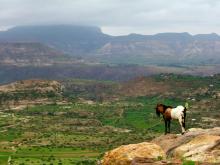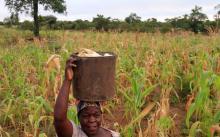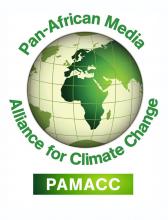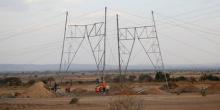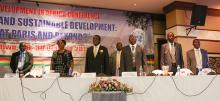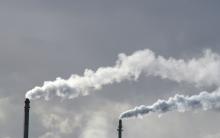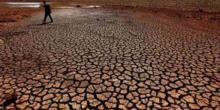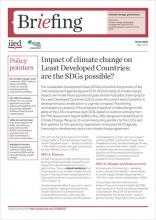On Friday, the African Pavilion at COP21 was officially opened aimed at union and solidarity in the face of climate change. The President of Benin, Yayi Boni, spoke at the opening; “Africa did not come here (COP21) to beg for money or assistance but to bring about commitment of all concerned to Africa’s adaptation needs.”
In The News
|
|
|
Martha Mafa, a subsistence farmer, carries a bucket of maize on her head in Chivi, about 378km (235 miles) south-east of the capital Harare, April 1, 2012. REUTERS/Philimon Bulawayo |
|
The 5th Conference on Climate Change and Development in Africa (CCDA-V) convened its final day on Friday, 30 October 2015, at the Elephant Hills Hotel, Victoria Falls, Zimbabwe. In the morning, two back-to-back parallel sessions were held on: Climate Data for Decision Making; Climate Change and Disaster Risk Reduction; Climate Change and Energy; Governance; Agriculture, Trade and Food Security; Gender; Climate Science; Climate Change and Youth; and Sustainable Development. A plenary followed, chaired by Franklyn Lisk, University of Warwick, on evaluating the performance of Article 2 of the UN Framework Convention on Climate Change (UNFCCC) for Africa. Chukwumeji Okereke, University of Reading, delivered a presentation with reactions from the panelists: David Lesolle, University of Botswana; Paul Desanker, UNFCCC Secretariat; Nkiruka Nnaemego, African Youth Initiative on Climate Change (AYICC); Washington Zhakata, Climate Change Management Department, Zimbabwe; and Seth Osafo, African Group of Negotiators (AGN). |
|
VICTORIA FALLS, Zimbabwe (PAMACC News) - 2015 has been a year of cascading transitions. Whilst these transitions can be branded as the end of the Millennium Goals, the ushering in of the Sustainable Development Goals or a successor treaty to Kyoto in Paris this December, the reality is that we are making space for yet another new world order.
It is a new order that signals that it is no longer right nor ethical for one sixth of humanity to go to bed hungry every night; whilst the rest of us celebrate our increasingly huge appetite for consumable goods. |
|
KUMASI, Ghana (PAMACC News) - Africa is expected to go into the UN climate talks in Paris this December with one voice and one position, to demand climate justice for the people on the continent.
With the impacts of extreme weather conditions dawning on people and livelihoods, local farmers and communities will be looking out for a way out of their climate vulnerabilities.
Africa is therefore emphasizing climate adaptation and finance to effectively deal with the effects of climate change. |
|
A major conference highlights concerns about climate change impacts and the need for green energy – but low expectations for Paris. n just three weeks, starting 30 November, negotiators from around the world will gather at the Paris Climate Change Conference, aiming to finalize a new global climate agreement. On 28–30 October in Victoria Falls, Zimbabwe, policy-makers and experts gathered at the fifth annual Climate Change and Development in Africa (CCDA) conference, “Africa, Climate Change and Sustainable Development: What is at Stake at Paris and Beyond?” SEI Senior Research Fellow Francis X. Johnson, who attended the conference with ESPA Fellow Anne Nyambane, offered his perspective on the discussions. Both are based in SEI’s Africa Centre in Nairobi. |
|
VICTORIA FALLS, Zimbabwe (IDN) - Just as climate change has been getting popular in development discourse over the past two decades, so has been climate financing, which refers to local, national or transnational funding, drawn from public, private and/or alternative sources. Climate finance is critical to addressing climate change because large-scale investments are required to significantly reduce emissions (mitigation), and for adaptation (coping with adverse effects). |
|
The notion of Intended Nationally Determined Contribution (INDC) in the climate negotiations emerged in the Lima Call for Climate Action, as a lifeline to pause the accelerated increase in global temperature. While INDC is framed as a bottom-up approach intended to expand the action-base for emission reduction, it is however undermined by the intrinsic skewedness in the respective share of emissions currently accounted for by different countries, and the inverse distribution in emission intensity between the top and the bottom emission ranking to merit an interchange. This raises major questions of imbalance in the global pursuit for emission reduction while simultaneously curbing climate risk burden with adaptation. Africa for example, was a major recipient of ‘benevolent’ support for the formulation of its INDC. For example 23 African countries received support for their INDCs from a single provider! This raised eyebrows in several quarters from where some of the following clarifications have been repeatedly demanded: Read more |
|
À quelques semaines de la 21e Conférence des parties de la Convention-cadre des Nations unies sur les changements climatiques (COP21), la coordinatrice du Centre africain pour la politique en matière de climat, Fatima Denton revient sur trois enjeux cruciaux de l'accord de Paris.
Jeune Afrique : Les négociations actuelles permettront-elles d’obtenir les financements nécessaires à la lutte contre le changement climatique lors de la Cop21 ? Fatima Denton : Lorsqu’on parle des finances climatiques, on évoque la responsabilité historique des pays industrialisés sur les émissions de gaz à effet de serre. La question sur les finances climatiques est l’une des plus complexes dans les négociations actuelles. Aucune architecture financière ne nous permet actuellement d’aborder tous les problèmes. Nous avons maintenant le fonds vert pour le climat [de l’ONU], doté de plus de 10 milliards de dollars, mais ce n’est pas suffisant. Read more... |
|
Helena Wright, Saleemul Huq, Jonathan Reeves The Sustainable Development Goals (SDGs) will define the priorities of the UN’s development agenda beyond 2015. But the reality of climate change impacts will render these aspirational goals almost impossibly challenging for the Least Developed Countries (LDCs) unless the current level of ambition in development and climate action is urgently increased. This briefing summarises our analysis of the projected impacts of climate change on the ability of the LDCs to achieve each SDG, based on evidence primarily from the Fifth Assessment Report (AR5) of the UN’s Intergovernmental Panel on Climate Change. We go on to recommend policy pointers for the LDCs and their partners for the upcoming negotiations on the post-2015 agenda, financing for development, and a new climate change agreement. |
